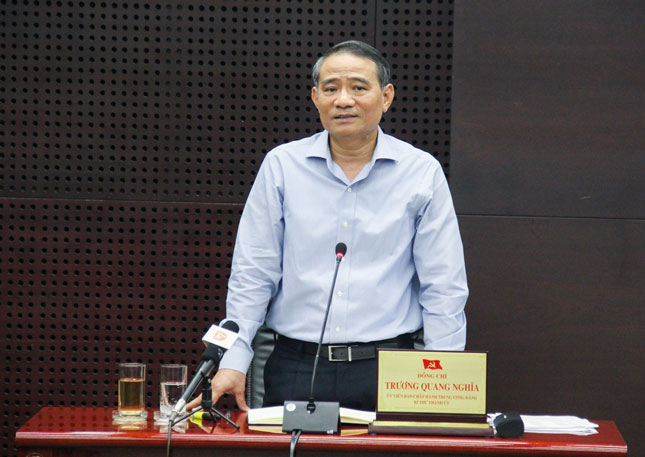Culture-a driving force for the city's sustainable development
Greater efforts should be make to promote culture’s important role in creating a momentum for boosting Da Nang’s socio-economic progress in a sustainable manner.
 |
| Da Nang Party Committee Secretary Truong Quang Nghia addressing Wednesday’s meeting |
The statement was made by municipal Party Committee Secretary Truong Quang Nghia during Wednesday’s meeting with other city leaders and representatives from the Department of Culture and Sports.
On the spotlight at the meeting were specific tasks the city Party chief assigned for the cultural sector.
The top city leader underlined a must-do to preserve, restore and uphold the great values of the existing local cultural and historical relic sites.
Active engagement in accelerating the city’s growth must occur simultaneously with the protection and promotion of the traditional cultural values.
Moreover, Secretary Nghia asked the Department of Culture and Sports to promote the effective implementation of a programme for building a cultural and civilised urban lifestyle amongst the city dwellers.
With regard to sports, importance will be attached to accelerating the development of high-achievement sports, and sporting activities for students and pupils.
As for instructions from municipal People’s Committee Vice Chairman Ho Ky Minh, the Department of Culture and Sports should focus on promoting the city’s hosting of international cultural and sporting events, thereby helping to affirm Da Nang’s stature as Viet Nam’s top destination for international events and festivals.
Another task is to fully tap the functionality of such popular cultural and sporting venues as the Museum of Da Nang, the Fine Arts Museum, the Hoang Sa Exhibition House, the Tien Son Sports Arena, and the Hoa Xuan Stadium.
It was also reported at the meeting that Da Nang has seen a boom in billboards featuring only foreign languages and/or inappropriate Vietnamese language text to catch the public’s attention. This violates the national Advertisement Law, and has brought about a negative local reaction, and it reflects a lack of respect for the national tongue and culture.
Secretary Nghia urged relevant local agencies to strengthen the State’s management of advertising activities, especially billboards in foreign languages. Stricter penalties should be imposed on violations of the national Advertisement Law.
The Advertisement Law, launched last year, stipulates that the advertisment content, whether spoken or written, must be in Vietnamese.
Foreign languages can only be adopted when representing foreign brands, trademarks, proper names or internationalised words which can’t be replaced with Vietnamese. In such cases, the signs must use both Vietnamese and a foreign language, and the foreign words must be no more than three-fourths the font size of the Vietnamese words, and placed beneath the Vietnamese words.
In particular, Secretary Nghia noted that, besides the application of administrative punishment, the more important thing is to ensure harmony between the promotion of business activities aimed at offering the best services for foreign visitors and the preservation of the Vietnamese language.